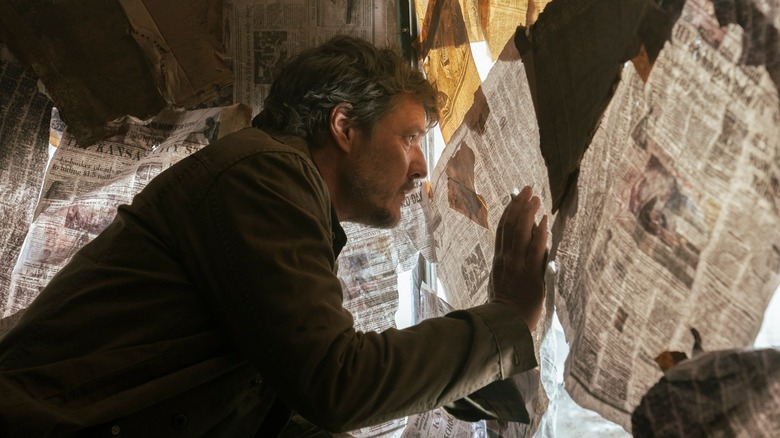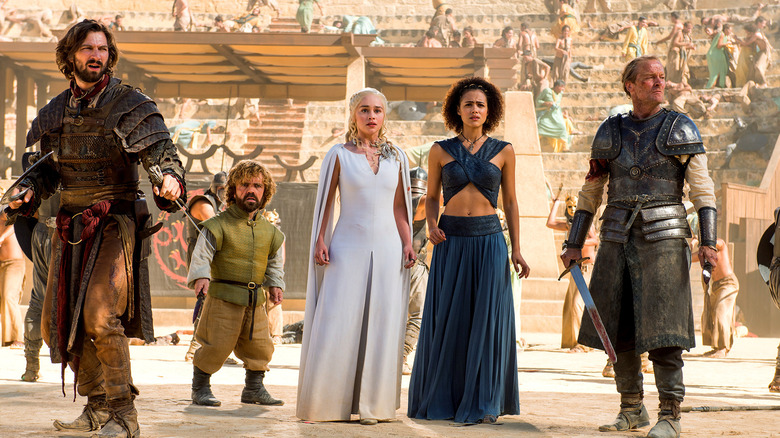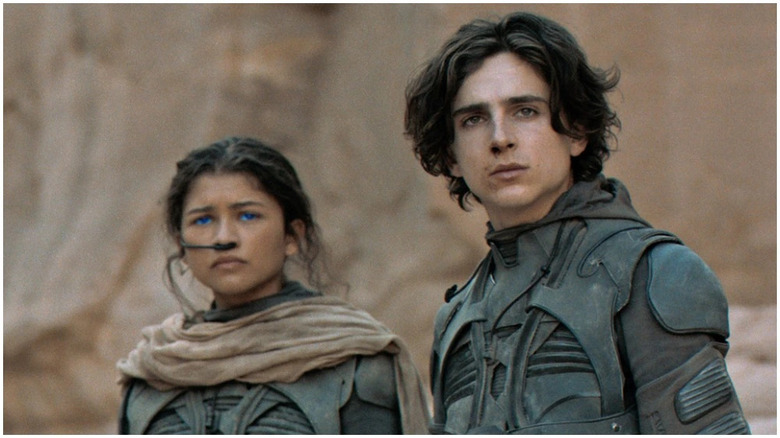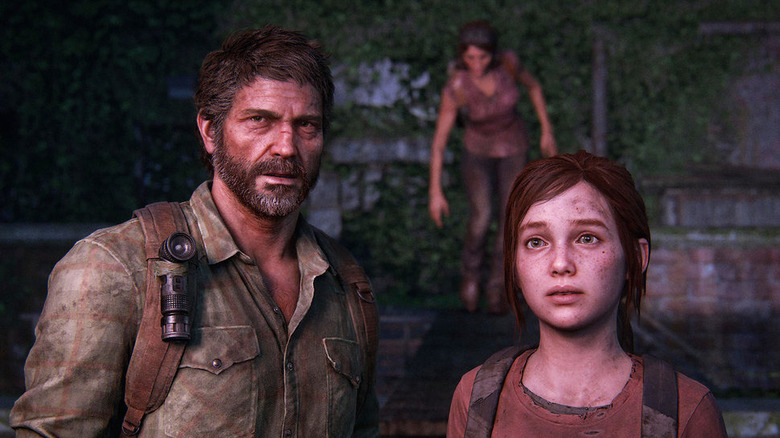The Last Of Us Series Feels More Like A Remake Than An Adaptation
This post contains spoilers for the first four episodes of "The Last of Us."
In today's arts and entertainment landscape, it seems that all bets are off when it comes to defining a work and its intentions: the terms "remake," "adaptation," "reboot," "reimagining," "rebootquel" and more are tossed around willy-nilly, with new descriptors being Frankensteined together every year. It's a reaction to the rampant increase of stories being told, retold, and revisited as Hollywood and its ilk seek to minimize risk by exploiting material they believe to be pre-sold. It's a real catch-22, to make something old seem new again.
HBO's "The Last of Us" series is being touted as an adaptation, and on the face of it this appears to be the correct term, given that the story first appeared in one medium (video games) and is now moving to another (live-action television). Yet, in execution, it's not so cut and dried. Thanks to franchise-crazy fandoms and appeasing filmmakers, fidelity to source material is prized above all else, and the mediums of video games and filmed entertainment have grown to closely resemble each other over the last couple decades. Thus, "The Last of Us" does not feel like a true adaptation, but rather a remake, a translation presenting the same story in a highly similar aesthetic with little deviation or innovation.
'The book was better'
"The Last of Us" showrunners Craig Mazin and Neil Druckmann (the latter being the creator of the original "Last of Us" video games) have been very vocal in the press about their goals for the TV series, stating how they "have no plans to tell any stories beyond adapting the games." This attitude is likely a reaction to a variety of things, among them the multi-season dragging out of AMC's "The Walking Dead" adaptation and the poor reaction to the final episodes of HBO's "Game of Thrones," which went its own way since author George R.R. Martin has yet to complete his novel series.
Yet I'd argue the primary reason Mazin and Druckmann want to make their aims so clear has to do with the perceived notion of adaptations supposedly failing their source material. Where this mentality arose from is a subject for another time, suffice to say that the conventional wisdom of "the book was better" has a lot to do with it. Hollywood has been adapting books for as long as the motion picture medium has existed, and the obvious difference between mediums — the limitless and varied imagination of a reader versus the more limited and decisive choices made by a filmmaker being foremost — combined with frequent vocal disappointment has fed such an axiom.
This belief has spread to include adaptations of any sort, not just novels: comic books, TV shows turned into films, films turned into TV shows, biopics, and of course, video games are all scrutinized should they deviate from their source in any way.
Adaptation versus remake
Admittedly, the lines between what separates an adaptation from a remake from a "reimagining" (or some such made-up term) are blurry; there's a good deal of nuance and subjectivity when it comes to such things.
The easiest, most concise definitions are that an adaptation is material from one medium being made for a different medium while a remake is material made for the same medium again. Yet these definitions don't account for the artistic intent of a work; there's a distinct difference between making something a statement of personal vision versus translating a pre-existing vision.
In most cases, personal and idiosyncratic visions come naturally. Look at the myriad versions of Frank Herbert's "Dune," for example: despite their telling the exact same story, the films made by David Lynch and Denis Villeneuve and the TV miniseries by John Harrison look and feel nothing like each other. Look at Rob Zombie's "Halloween" remake, which, despite using a large amount of the 1978 script by John Carpenter and Debra Hill in its back half, is still recognizably Zombie's.
Even with more experimental exercises, the difference between visions (or not) can be seen. Gus Van Sant's "Psycho," a remake using the same Joseph Stefano script from Alfred Hitchcock's film (itself an adaptation of Robert Bloch's novel), feels authentically like a Van Sant film given the cumulative effect of the filmmaker's updates and deviations from the story. Meanwhile, Zack Snyder's film of the "Watchmen" comic book miniseries, despite its obvious deviations from the Alan Moore and Dave Gibbons original, feels rigidly beholden to the comic book in its recreating not just the comic's story but its exact framing and dialogue.
With Druckmann heavily involved in "The Last of Us" series — writing and directing select episodes — the series is less a new vision and more just a translation between mediums.
The video game/movie singularity
When video games first arrived, they either contained no story or, if they did, the limitations of the medium meant they hardly resembled movies. Once graphics engines began to develop (or, conversely, PC's and consoles gained the ability to insert full motion video cutscenes in between gameplay), the industry immediately sought to present video games as a form of interactive movie, succeeding where filmmakers of the past like William Castle had failed.
As it currently stands, the video game industry is saturated with tropes and visual cues and compositions swiped from movies and television: virtually every game made today, be it anything from an open-world RPG to level-based shooter, contains cinematic cutscenes, complete with opening and closing credit rolls. Developer Naughty Dog, whose co-president is Neil Druckmann, have been a leader and pioneer in bringing character-based stories to video games, and "The Last of Us" is a shining example of such.
"The Last of Us" doesn't use cutscenes and its script as mere glue between gameplay moments. Its cutscenes are the real star of the show, with actors like Troy Baker and Ashley Johnson (the original Joel and Ellie) having their performances captured in much the same manner as that of Andy Serkis in "The Lord of the Rings" or "Planet of the Apes" films. While playing "The Last of Us" is obviously an immersive experience, it's not one tailored to the player, telling the same narrative despite skill level and other variations.
Given this, the "Last of Us" TV series, despite being well-made and featuring excellent performances from its cast (especially the new Joel and Ellie, Pedro Pascal and Bella Ramsey), feels disappointingly unsurprising and borderline redundant. While there's potentially a case to be made for viewers of the show who've never played the games before, it's still disheartening to see Tess (Anna Torv) die in episode two in the exact same circumstances and setting as she does in the game. Even the blocking and composition feels identical, as if the episode used the game as a storyboard. It robs the moment of its full potential impact, and is the most egregious example of the show being far too beholden to its source.
Embrace change
As of episode four, "The Last of Us" is rigidly following Joel and Ellie's path from the first game, finding them ambushed by bandits and crossing the path of brothers Henry (Lamar Johnson) and Sam (Keivonn Woodard). Given that the fates of Tess from episode 2 and Joel's daughter Sarah (Nico Parker) from episode 1 went down the exact same way as they do in the game, it's a bummer that we've hardly met Sam and yet have a 90% accurate guess as to what's going to happen to him.
Perhaps there's hope, however. As most people who make adaptations and remakes know, it's possible to be faithful to the spirit of the source material without being slavish to the letter. While "The Last of Us" hasn't demonstrated this very often, its remarkable third episode does exactly this, remixing the story of Bill (Nick Offerman) and Frank (Murray Bartlett) in a genuinely moving and surprising fashion.
As the show continues to air, some folks online who're familiar with the games are already arrogantly crowing about knowing what's in store for the series, predicting that unaware viewers will be shocked by the season 1 finale. Let's hope Mazin, Druckmann, and the rest of their team follow in the third episode's footsteps and find a way to give us all a unique and delightful experience rather than a regurgitated one.




